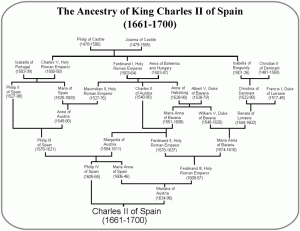 Today is, of course, the day of the Royal Wedding, with new blood entering the British royal line, and the hope of new heirs to our throne. And of course the question on the lips of all British geneticists is: will there be any new royal genetic diseases in this crop? The European royal lines have always been prone to the odd loss-of-function mutation. An unlucky mutation in Queen Victoria’s Factor IX gene caused a nasty case X-linked Haemophilia B in her male descendants (a mutation that was only mapped in 2009 by sequencing the bones of the murdered Romanov branch). Luckily for them, this mutation hasn’t been observed in any of Victoria’s descendants lately; while it can hide undetected in women, this obviously doesn’t apply to William. More systemic genetic problems have been the result of heavy inbreeding; Charles II of Spain, with his distressingly bushy family tree (left), suffered from severe Habsburg jaw, along with a host of other genetic complaints.
Today is, of course, the day of the Royal Wedding, with new blood entering the British royal line, and the hope of new heirs to our throne. And of course the question on the lips of all British geneticists is: will there be any new royal genetic diseases in this crop? The European royal lines have always been prone to the odd loss-of-function mutation. An unlucky mutation in Queen Victoria’s Factor IX gene caused a nasty case X-linked Haemophilia B in her male descendants (a mutation that was only mapped in 2009 by sequencing the bones of the murdered Romanov branch). Luckily for them, this mutation hasn’t been observed in any of Victoria’s descendants lately; while it can hide undetected in women, this obviously doesn’t apply to William. More systemic genetic problems have been the result of heavy inbreeding; Charles II of Spain, with his distressingly bushy family tree (left), suffered from severe Habsburg jaw, along with a host of other genetic complaints.
In terms of inbreeding, there has been a bunch of digging around in the press to find the closest common ancestor of William and Kate: Channel Four turned up fourteen and fifteenth cousinships, and the Daily Mail managed to find a eleventh cousinship. For comparison, William’s parents Diana and Charles were also 11th cousins, and the Queen and Prince Philip were a far more regal 2nd cousins once removed. Eleventh cousins share on average 60-parts-per-billion of DNA, or about 180bp (although with wide variation due to the spotty nature of meiotic recombination: in fact, 99.5% of 11th cousins will share no stretches of DNA through recent descent at all, while the remaining 0.5% will typically share tens of thousands of bases). Given that the average person harbours about 10 recessive diseases, this gives about a 1 in 1.6 million chance of Kate and Will’s offspring developing a royal disease due to a piece of DNA shared between them. So, not very likely then.
In fact, eleventh cousins is a pretty low degree of relatedness, by the standard of these things. A study of inbreeding in European populations found that couples from the UK are, on average, as genetically related as 6th cousins (the study looked at inbreeding in Scots, and in children of one Orkadian and one non-Orkadian. No English people, but I would be very suprised if we differed significantly). 6th cousins share about 0.006% of their DNA, and thus have about a 0.06% chance of developing a genetic disease via a common ancestor. Giving that the Royal Family are better than most at genealogy, we can probably conclude that the royal couple are less closely related than the average UK couple, and thus their children are less likely than most to suffer from a genetic disease. Good news for them, bad news for geneticists, perhaps?







